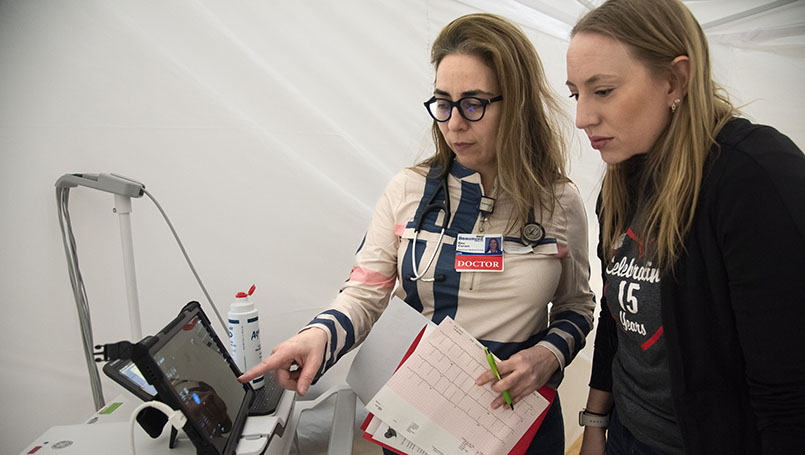Thursday, February 16, 2023

When it comes to lowering your risk of heart disease, nothing is as important as living a healthy lifestyle. And when it comes to the changes you can make to get there, there’s one thing that’s moved toward the head of the list.
“In the past, we would talk about keeping blood pressure, diabetes and cholesterol under control, not smoking and then activity,” says Dr. Rita Coram, an interventional cardiologist with Corewell Health Dearborn Hospital and Corewell Health William Beaumont University Hospital in Royal Oak. “But in the past couple of years, I think keeping active is No. 1. I tell people living a sedentary lifestyle is the new smoking.”
A recent large 10-year study found that the combination of sitting for prolonged periods and physical inactivity increased the risk of heart disease and early death, and was nearly as harmful as smoking. Sitting for eight or more hours per day was linked to about a 20% higher risk of getting heart disease or dying from any cause, while sitting for six to eight hours per day was linked to a 12% higher risk of early death and a 13% higher risk of heart disease.
The study also found that people who were active but still sat for prolonged periods daily were at an increased risk of heart disease and early death. Or, as Coram puts it, your risk of heart disease is still increased if you “go to the gym once or twice a week then the rest of the week you’re completely sedentary.”
While different studies have come up with different numbers for how long and often you should move, Coram says specific numbers aren't as important as finding practical ways to make sure you’re getting off your posterior and onto your feet.
“It’s not hard science. If on average you get up every hour and do something, that’s movement,” she says. “You want continuous movement that totals at least a half hour a day.”
While taking a 30-minute or more brisk walk every day is ideal, Coram says there are other ways to get activity into your day — especially for the elderly or those with health conditions that might prevent them from moving for longer stretches.
“I tell patients, when you’re watching TV, get up and move when a commercial comes on,” says Coram, who also recommends using watches or apps that track daily movement. “Getting up even two minutes improves venous pressure and the point is moving enough so you don’t have venous congestion.”
Just because more research is showing the importance of consistent movement for heart health doesn’t mean those old standbys such as diet and knowing your numbers no longer apply. Here are five ways to improve your heart—and overall—health:
- Know your risk factors. It’s important to know your blood pressure, cholesterol and blood sugar numbers. “Go to the doctor and ask, ‘Am I doing all I can to decrease my risk of heart disease?’” advises Coram.
- Eat a healthful diet. You’re probably heard it a million times: Eat more fruits and vegetables. And while doing so is great for your heart, Coram says you also need to make sure you avoid processed foods, sugar and “drinking your calories” by consuming unhealthy sodas or sweetened iced teas and sports drinks.
- Get moving. The American Heart Association recommends adults engage in at least 150 minutes of moderate-intensity aerobic activity or 75 minutes of vigorous activity each week. And, as you’ve already read, keep moving throughout the day and avoid sitting for prolonged stretches of time.
- Don’t smoke. Simply put, smoking any form of tobacco is one of the biggest risks for heart disease. Quitting isn’t easy, but necessary, says Coram. “No meds, no patches, nothing takes care of [quitting smoking]. It has to come from within,” she says. “But as soon as you stop, you are decreasing your risk of further heart disease.”
- Chill out. More and more research is showing that negative mental health has a negative effect on the cardiovascular system and vice versa.
This story originally appeared in the Detroit Free Press 2023 Heart Guide.
